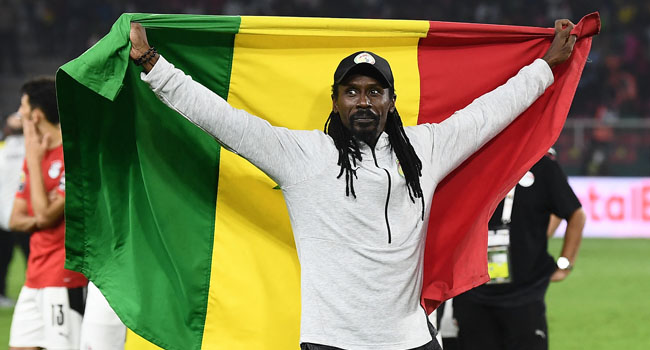After losing the semifinal to eventual tournament winners Senegal, Burkina Faso's head coach Kamou Malo paid tribute to Senegal counterpart Aliou Cisse, saying that as one of the small handful of African coaches, Cisse was "fighting a fight I have an affinity for." Malo added that: "African leaders must trust local coaches."
With 15 of the 24 head coaches at this AFCON native to the country they were leading, local coaches appear to have broken through to a level long reserved for European coaches. Cisse's victory after five years in charge shows the value of continuity and trust in coaching.
But do the success stories of nations like Burkina Faso and Gambia mean that the coaching pathway has truly opened up for local coaches in Africa?
While impossible to say definitively for such a large and diverse continent, there are indications from various nations that, while the sight and success of Cisse at Senegal is great, there is a big difference between him and those aspiring to follow in his footsteps.
Lack of opportunity
Anthony Kimani is a former Kenya international who is currently an assistant coach for Kenyan Premier League side Bandari in Mombasa. After injury forced him to stop playing, Kimani got his first coaching qualification in 2015. The next coaching course available to him in Kenya was two years later. In 2021, he completed his Confederation of African Football (or CAF) B licence. Remarkably, it was the first CAF B licence course on offer in Kenya in 10 years.
"As an upcoming coach I have encountered a few stumbling blocks along the way, but the major one is that the number of coaching courses are few and far between," Kimani told DW.
"I feel this is an issue CAF should look closely at and with member associations so that all coaches around Africa can get a fair playing ground and be able to help coaches develop and progress."
Furthermore, Kimani nearly didn't get the chance to complete his B licence due to a lack of courses but also due to administrative problems. But not only that — he and the 24 other coaches on the course had to wait three to four years to get certification of their previous coaching qualification, preventing them from progressing to the next stage.
What makes this more frustrating for Kimani is that he found these courses challenging and professional, something which has not always been true of coaching courses in Africa. This has often made it hard for nation-specific identities to be developed.
The Confederation for African Football has mandatory coaching qualifications for coaches in Africa, from the D licence, specifically aimed at U12 coaching, all the way up to the A licence.
A coach with a CAF B licence used to get on UEFA A courses, but that is seemingly no longer the case. Both CAF and UEFA were asked to clarify this matter, but neither responded to DW's enquiries.
If coaches do get their badges, then opportunities remain hard to find.
"The two biggest teams in Kenya don't seem to be giving local coaches a chance to develop their philosophies. All coaches deserve equal opportunities. If you're giving coach A two years, it's only fair to give coach B the same,” said Kimani.
Bringing people together
For Mas-Ud Didi Dramani, planning is key.
"When we are aligned, communication aligned, player's mindset, values are worked on. This is key to the direction of African football," Dramani told DW.
View this post on Instagram
">https://www.instagram.com/p/CPOr9FMNPxO/?utm_source=ig_embed&utm_campaign=loading" data-instgrm-version="14" style=" background:#FFF; border:0; border-radius:3px; box-shadow:0 0 1px 0 rgba(0,0,0,0.5),0 1px 10px 0 rgba(0,0,0,0.15); margin: 1px; max-width:540px; min-width:326px; padding:0; width:99.375%; width:-webkit-calc(100% - 2px); width:calc(100% - 2px);">
View this post on Instagram
Dramani is a technical director at the Right to Dream academy. The 55-year-old Ghanian has seen the development of coaching in Ghana and across Africa since retiring from playing in 2000. He went on to be an assistant coach of Ghana's women's national team, and was even part of the first ever CAF coaching course in 2007.
"Everybody wants money. If you work at the bank, does your money follow your home? You need to put in plans and work towards it."
"Nigeria should be building a team, Ghana should be building a future with these players. [Winning] AFCON is just a bonus. I think we are putting something together that looks interesting — that should be the focus."
Coaches left behind
Dramani, who speaks to 50-odd coaches a day trying to pass on knowledge, believes the presence of coaching licensing boards, infrastructure and youth development programs are all helping to professionalize clubs and coaching.
Nevertheless, equal opportunity remains a problem.
With that in mind, Ezirim Kennedy founded the African Coaches League (ACL), a nonprofit organization offering sports education to less-privileged coaches across the continent.
"I set up the African Coaches League to help bridge the gap in illiteracy amongst coaches in Africa, which has affected the development a lot of children," Kennedy told DW.
Kennedy believes that not only are the current support mechanisms and qualifications for coaches inadequate, but that without better coaches, children's lives are impacted.
Better coaching can make a difference because it teaches young children "morality, respect, values and good orientation," goes the argument.
The ACL now has a messaging group with more than a thousand coaches. Kennedy sends through coaching materials, education activities, videos and opportunities for them to learn.
"I want to see true grassroots development in unreached countries in Africa," Kennedy says.
Clearly the coaching landscape has improved compared to previous years, as the number of African head coaches at AFCON shows.
But course provision and coaching opportunities are just two examples of how much work must still be done to help further develop the next generation of eager African coaches.
Source: DW
